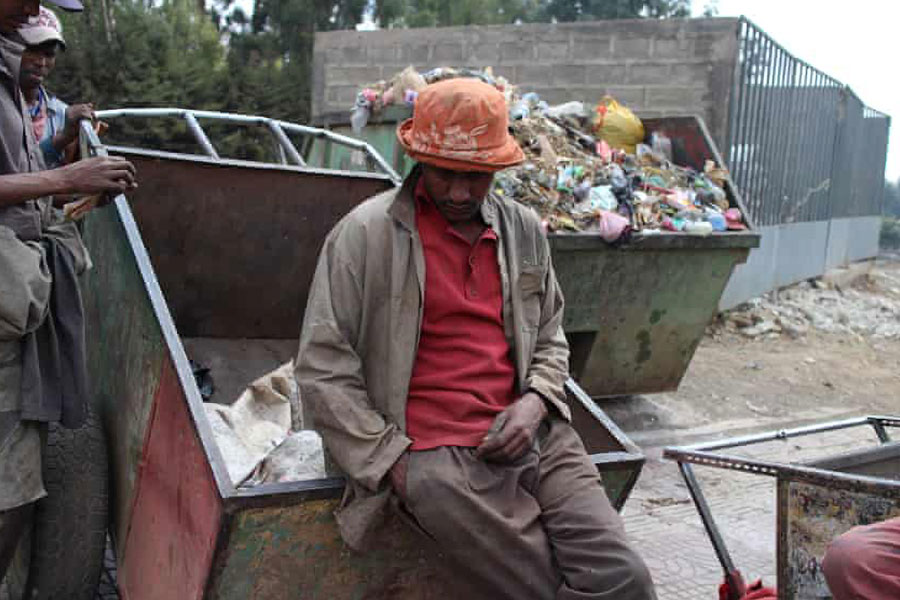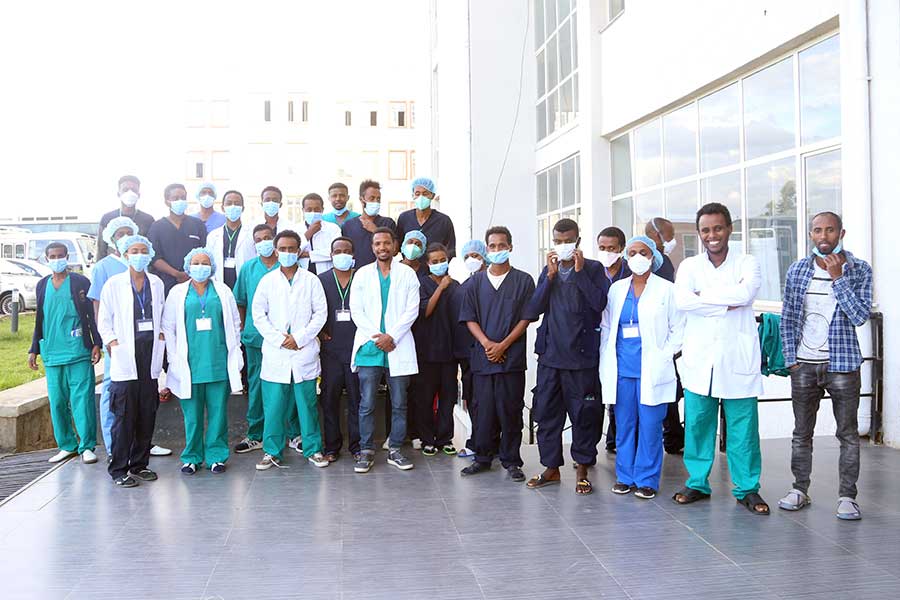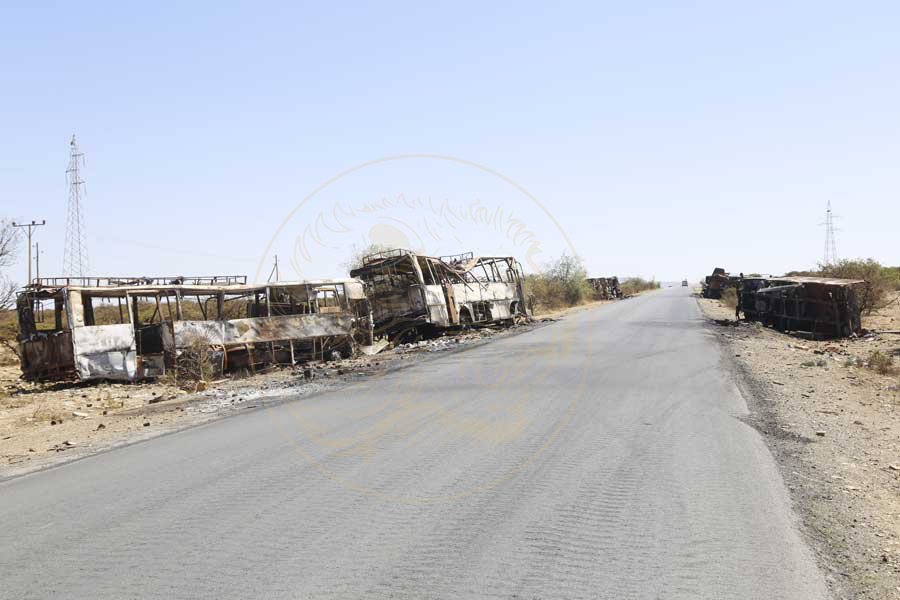
Radar | Oct 31,2022
Oct 24 , 2020
By Fisseha Shiferie
Ethiopia confirmed its first case of the Novel Coronavirus (COVID-19) in March 2020. A few weeks later, a five-month state of emergency (SOE) was declared, and several businesses, schools and theatre halls were closed. People were advised to work from home, including permitting telecommuting for many government officials.
As a means to tackle the spread of the virus, the government opened a campaign for the public to exercise hygiene measures such as washing hands frequently and social distancing.
As COVID-19 cases surged, wearing face masks in public places has become a requirement. Its implementation has been followed up by the police and other law enforcement bodies. Individuals who were not adhering to this order were actually arrested.
Currently, the “wear a face mask in public areas” order seems arguably successful in Addis Abeba. There are reasons for this. The fear of getting arrested or penalised might have been the primary motivator, and the ease of use and affordable price of masks is another. At pharmacies, a disposable surgical face mask goes for just 10 Br. Another reason might have been the tremendous effort of healthcare professionals and public campaigns in creating awareness about the importance of wearing face masks.
The wide usage of this simple preventive measure is all the more important in that dense cities such as Addis Abeba make it hard to adhere to the rule of physical distancing. This is especially the case in marketplaces, bus and taxi stations and places of worship. The frequent water outage in the city also makes hand hygiene a rather difficult task.
Wearing face masks will thus remain the most important preventive measure as businesses and schools reopen. Despite controversies in some countries about their use by the public, recent studies show that they play a pivotal role in the prevention and control of infectious respiratory disease transmission, including COVID-19.
As health professionals and the government insist that people make use of face masks, it is also equally important to give guidance on how to dispose of or recycle them safely.
The urgency of this comes in people’s violations of rules when it comes to disposing of masks they used. It has now become common to see used masks scattered everywhere - on sidewalks and in parking lots. Although rampant littering of plastic bottles, papers and banana skins was the norm before the pandemic, the magnitude of the problem is worsening with the littering of potentially COVID-19 infected masks in public and open spaces.
Public health experts say that improperly discarded masks could be potential sources of the virus if people come into contact with them. In cities like Addis Abeba, where thousands of individuals (including children) make their lives working in the streets, coming into contact with these contaminated face masks becomes easy. In the worst cases, they might even be tempted to use them, if not to wear on their faces but to make use of them in some other way.
This would be very dangerous and can put the health of individuals at great risk if disposed face masks contain respiratory secretions. An environmental disaster seems to be looming in this regard. There is a high chance for masks to get washed away and end up in oceans, rivers and lakes, affecting flora and fauna negatively.
It does not require one to be an environmental health expert or possess a special knowledge to keep our surroundings clean and appealing. All we need is to be responsible individuals in our routine daily activities. The least we can do is to keep the refuse in our car, luggage or plastic bag until we get a rubbish bin where we can safely dispose of them. If we do not find one on our way, we can throw them into a closed bin when we get back home.
Providing awareness creation programmes would certainly be one way of curbing the problem. The negative impact contaminated face masks would cause on the health of individuals, especially to vulnerable groups, and the harm they would bring to the environment can be concisely presented in short videos or posters. The programme can reach the public through available communication channels such as radio, television or social media platforms.
Preparing guidelines about safe disposal of face masks in particular and personal protective equipment (PPE) in general is highly needed now more than ever. While guidelines regarding proper medical waste management are available in healthcare settings, guidelines for proper face mask disposal is either unavailable or has not reached communities well.
Introducing laws that can prohibit improper disposal of used PPEs could help reduce the problem. The police force and other law enforcement bodies need to closely monitor individuals’ practices regarding improper face mask disposal in every corner of the city. Those who go against the law should receive appropriate punishment.
Important here is the need for more rubbish bins. Awareness campaigns and laws will go unheeded if the necessary infrastructure is not in place to make it easy for people to carry out such tasks.
Elimination of COVID-19 can only be achieved with vaccines, and there are currently none in the market. It has been a long time now since the pandemic has significantly changed our way of life. The "new normal" has officially begun in our city since March 2020. As it is compulsory to wear face masks in public spaces, it should also be our responsibility to dispose of them safely and properly. Unless we do this, we will continue to live under threat to our lives.
PUBLISHED ON
Oct 24,2020 [ VOL
21 , NO
1069]


Radar | Oct 31,2022

Radar | May 23,2020

Fortune News | Jun 05,2021

View From Arada | Oct 09,2021

Radar | Oct 23,2018

Fortune News | Sep 10,2022

My Opinion | Dec 04,2021

View From Arada | May 01,2020

Fortune News | Mar 13,2021

Radar | Oct 12,2024

My Opinion | 131586 Views | Aug 14,2021

My Opinion | 127942 Views | Aug 21,2021

My Opinion | 125917 Views | Sep 10,2021

My Opinion | 123541 Views | Aug 07,2021

Dec 22 , 2024 . By TIZITA SHEWAFERAW
Charged with transforming colossal state-owned enterprises into modern and competitiv...

Aug 18 , 2024 . By AKSAH ITALO
Although predictable Yonas Zerihun's job in the ride-hailing service is not immune to...

Jul 28 , 2024 . By TIZITA SHEWAFERAW
Unhabitual, perhaps too many, Samuel Gebreyohannes, 38, used to occasionally enjoy a couple of beers at breakfast. However, he recently swit...

Jul 13 , 2024 . By AKSAH ITALO
Investors who rely on tractors, trucks, and field vehicles for commuting, transporting commodities, and f...

Jun 28 , 2025
Meseret Damtie, the assertive auditor general, has never been shy about naming names...

Jun 21 , 2025
A well-worn adage says, “Budget is not destiny, but it is direction.” Examining t...

Jun 14 , 2025
Yet again, the Horn of Africa is bracing for trouble. A region already frayed by wars...

Jun 7 , 2025
Few promises shine brighter in Addis Abeba than the pledge of a roof for every family...

Jun 29 , 2025
Addis Abeba's first rains have coincided with a sweeping rise in private school tuition, prompting the city's education...

Jun 29 , 2025 . By BEZAWIT HULUAGER
Central Bank Governor Mamo Mihretu claimed a bold reconfiguration of monetary policy...

Jun 29 , 2025 . By BEZAWIT HULUAGER
The federal government is betting on a sweeping overhaul of the driver licensing regi...

Jun 29 , 2025 . By NAHOM AYELE
Gadaa Bank has listed 1.2 million shares on the Ethiopian Securities Exchange (ESX),...